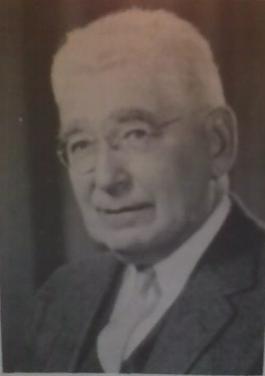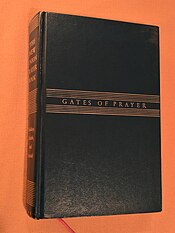
Reform Judaism, also known as Liberal Judaism or Progressive Judaism, is a major Jewish denomination that emphasizes the evolving nature of Judaism, the superiority of its ethical aspects to its ceremonial ones, and belief in a continuous search for truth and knowledge, which is closely intertwined with human reason and not limited to the theophany at Mount Sinai. A highly liberal strand of Judaism, it is characterized by lessened stress on ritual and personal observance, regarding halakha as non-binding and the individual Jew as autonomous, and great openness to external influences and progressive values.

A siddur is a Jewish prayer book containing a set order of daily prayers. The word siddur comes from the Hebrew root ס־ד־ר, meaning 'order.'
Aleinu or Aleinu leshabei'ach, meaning "it is upon us" or "it is our obligation or duty" to "praise God," is a Jewish prayer found in the siddur, the classical Jewish prayerbook. It is recited in most communities at the end of each of the three daily Jewish services and in the middle of the Rosh Hashanah mussaf. It is also recited in many communities following Kiddush levana and after a circumcision is performed. It is second only to the Kaddish as the most frequently recited prayer in current synagogue liturgy.
Kol Nidre is a Hebrew and Aramaic declaration which is recited in the synagogue before the beginning of the evening service on the night of Yom Kippur. Strictly speaking, it is not a prayer, even though it is commonly spoken of as if it were a prayer. This declaration and its ceremonial accompaniment have been charged with emotional undertones since the medieval period, creating a dramatic introduction to Yom Kippur on what is often dubbed "Kol Nidrei night", with the entire Yom Kippur evening service popularly called Kol Nidrei.

The machzor is the prayer book which is used by Jews on the High Holy Days of Rosh Hashanah and Yom Kippur. Many Jews also make use of specialized machzorim on the three pilgrimage festivals of Passover, Shavuot, and Sukkot. The machzor is a specialized form of the siddur, which is generally intended for use in weekday and Shabbat services.
The Union for Reform Judaism (URJ), known as the Union of American Hebrew Congregations (UAHC) until 2003, founded in 1873 by Rabbi Isaac Mayer Wise, is the congregational arm of Reform Judaism in North America. The other two arms established by Rabbi Wise are the Hebrew Union College-Jewish Institute of Religion and the Central Conference of American Rabbis. The current president of the URJ is Rabbi Rick Jacobs.
Lekha Dodi is a Hebrew-language Jewish liturgical song recited Friday at dusk, usually at sundown, in synagogue to welcome the Sabbath prior to the evening services. It is part of Kabbalat Shabbat.

Reform Judaism is one of the two World Union for Progressive Judaism–affiliated denominations in the United Kingdom. Reform is relatively traditional in comparison with its smaller counterpart, Liberal Judaism, though it does not regard Jewish law as binding. As of 2010, it was the second-largest Jewish religious group in the United Kingdom, with 19.4% of synagogue-member households. On 17 April 2023, Reform Judaism and Liberal Judaism announced their intention to merge as one single unified progressive Jewish movement. The new movement, which may be called Progressive Judaism, will represent about 30% of British Jewry who are affiliated to synagogues.

Congregation Beth Israel is a synagogue located in West Hartford, Connecticut. The synagogue is one of the two oldest Jewish congregations in Connecticut and one of the largest Reform Jewish congregations in New England, with about 900 member families and about 2,000 individual members.

The Liberal Jewish Synagogue, or LJS, is a house of prayer in St John's Wood, London, founded in 1911. It is the oldest and largest member of Britain's Liberal Judaism, a constituent member of the World Union for Progressive Judaism.
Siddur Sim Shalom refers to any siddur in a family of siddurim, Jewish prayerbooks, and related commentaries, published by the Rabbinical Assembly and the United Synagogue of Conservative Judaism.

Solomon Bennett Freehof was a prominent Reform rabbi, posek, and scholar. He served as president of the Central Conference of American Rabbis and the World Union for Progressive Judaism. Beginning in 1955, he led the CCAR's work on Jewish law through its responsa committee. He also spearheaded changes to Reform liturgy with revisions to the Union Prayer Book (siddur). For many years, he served as the pulpit rabbi at Rodef Shalom in Pittsburgh, PA.
Temple Beth Israel was a Reform synagogue located at 840 Highland Road in Sharon, Pennsylvania. Originally called House of Israel Congregation, it was founded in 1888 as an Orthodox congregation by Jews from Eastern Europe.
The Union Prayer Book was a Siddur published by the Central Conference of American Rabbis to serve the needs of the Reform Judaism movement in the United States.

Minhag America is a siddur created in 1857 by Rabbi Isaac Mayer Wise that was intended to address conflict between sides supporting and opposing traditionalism in early Reform Judaism in the United States. The prayer book was accepted by the majority of Reform congregations in the western and southern United States.

Mishkan T'filah—A Reform Siddur is a prayer book prepared for Reform Jewish congregations around the world by the Central Conference of American Rabbis (CCAR). Mishkan T'filah is Hebrew for "Dwelling Place for Prayer" and the book serves as a successor to Gates of Prayer, the New Union Prayer Book (GOP), which was released in 1975. In 2015, CCAR released the complementary Mishkan HaNefesh machzor for the High Holy Days. CCAR also produces a host of print and electronic materials to supplement the Mishkan T'filah book.
Lawrence A. Hoffman is an American Reform rabbi and a prominent scholar of Jewish liturgy. He is known for his liberal religious views.
Bet Mishpachah is a Jewish egalitarian worshiping community in the Dupont Circle area of Washington, D.C., US. It is one of a number of national and international Jewish communities of "LGBT affirming congregations" that specifically welcome and "embrace" the LGBT community, along with all others who "wish to participate in an inclusive, egalitarian, and mutually supportive community." Membership is open to all singles, couples, and families, regardless of religious affiliation, sexual orientation, or gender identity.

Reform Congregation Keneseth Israel is the sixth oldest Reform Jewish synagogue in the United States. It began in Philadelphia in 1847, and was at a number of locations in the city before building a large structure on North Broad Street in 1891. In 1900 KI, as it is known, was one of the largest Reform congregations in the United States. It remained at the North Broad Street address until 1956 when it moved north of the city to suburban Elkins Park, Pennsylvania.

A Mi Shebeirach is a Jewish prayer used to request a blessing from God. Dating to the 10th or 11th century CE, Mi Shebeirach prayers are used for a wide variety of purposes. Originally in Hebrew but sometimes recited in the vernacular, different versions at different times have been among the prayers most popular with congregants. In contemporary Judaism, a Mi Shebeirach serves as the main prayer of healing, particularly among liberal Jews, to whose rituals it has become central.











